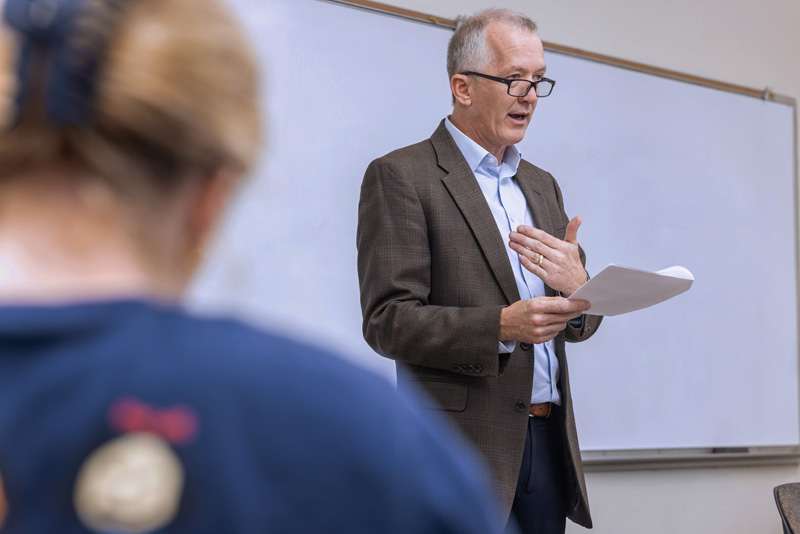
As the centennial festivities continue throughout the year and the Rhodes community celebrates everything that makes the college so special, the faculty, staff, and college administration linger on one key question: How do we make the next 100 years as special as the first? Dr. Charles Diehl’s vision for an institution of higher learning closely intertwined with its host city has been realized, but there’s no time to rest on any laurels. Challenges face higher education institutions around the country, and Rhodes is well-placed to flourish for the next 100 years and beyond.
“We’re always looking to reaffirm that Rhodes is a community treasure, a real community asset in Memphis,” says President Jennifer Collins. “And it’s worth reminding people that we provide a transformative education that helps shape and develop leaders of character and integrity in whatever field they choose to pursue.”
Rhodes is approaching its career and professional development program with renewed vigor, building on the already-excellent Career Services office while aiming to provide one of the best experiences of its kind in the country. “We’re always looking to expand,” says President Collins. “We have every asset necessary to do that thanks to our good fortune of being in a vibrant city such as Memphis. If you want to go to medical school, we say come here and experience an incredible research opportunity at St. Jude, Le Bonheur, Methodist, or Church Health, or utilize our Health Professions Advising program and the incredible opportunity to do research with our own faculty in their labs, and you’ll be as prepared for medical school as any student in the country.
“If you want to be a vet, come intern at the Memphis Zoo; if you want to be a lawyer, come work at a social justice organization in Memphis or in the court system. We provide these boundless opportunities for students to successfully pursue the careers they want. And I want to do everything we can to double down and expand on those opportunities even further."
In academic affairs, the focus remains on maintaining an outstanding faculty who engage in interdisciplinary work, and adapting the curriculum to a rapidly changing world. Provost and Vice President of Academic Affairs Timothy Huebner reflects on his time at Rhodes and how the college will grow. “The world has changed a lot in the 30 years I’ve been here, and it will surely change much more in the next hundred years. But we are in a very strong position to navigate and to embrace those changes, whatever they are.”Over the last 10 years, Rhodes has consistently incorporated new majors and avenues of study. A new data analytics major showcases the signature interdisciplinary approach with concentrations in 13 different departments, tasking students to analyze real-world data to think about social, political, environmental, and ethical issues. The modern Media Studies Program analyzes with a critical eye the large volume of film, tv, and social media content that we consume on an everyday basis. A new law and society minor, set to roll out this fall, combines history, political science, philosophy, and English.
“We are equipped to adapt to student interest, to changing times, to social and cultural forces that have changed the country,” says Huebner. “But our bedrock values as a liberal arts college will not change.” With around 67 percent of Rhodes faculty having tenure, there is a strong academic foundation on which professors can frequently discuss, exchange, and collaborate on ideas.

Stability also means there are always new ideas to bolster the curriculum. “Building out a computer engineering program is one such idea,” says Huebner. Faculty have also cast their eye further afield, with interest in building a Center for Democracy and Civil Discourse. Such a program would include a new Maymester in Washington, D.C., that could evolve into a full semester program.
“A democracy and civil discourse center would provide new avenues to explore modern social and political issues,” says Huebner. “And we’re always looking to build programs like this. The new Spence Wilson Center for Interdisciplinary Humanities is one we’re thrilled to have, and we’re also exploring an expanded center for data analytics that would allow us to have teams of students solve issues in Memphis with data.”
“What won’t change is our commitment to excellence, and that goes all the way back to Diehl,” says Huebner. “You can go out to his statue and think of this idea of building an institution that would last for generations to come. You wrap all those things up together that we do well—an excellent faculty, an outstanding student body, a beautiful campus in a vibrant city—that is Charles Diehl’s vision. That’s what we’re doing 100 years later, and that’s what we’ll do for the next 100 years.”
